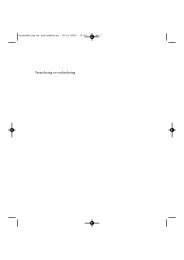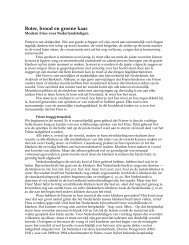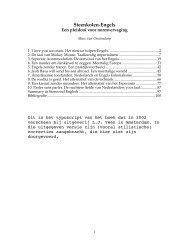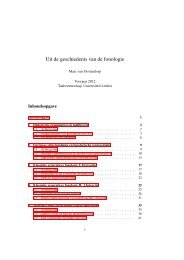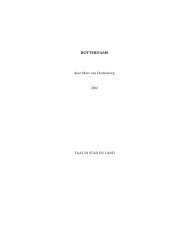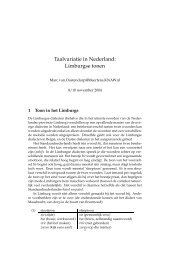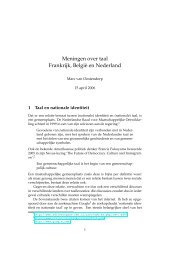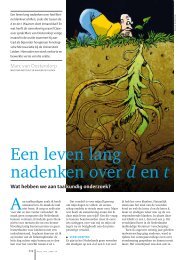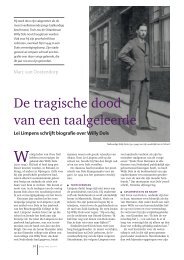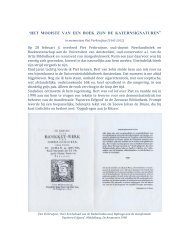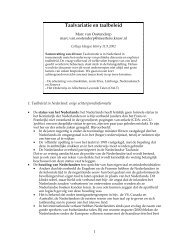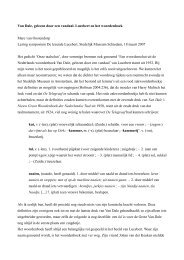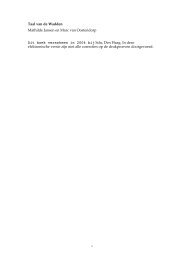Quantity and the three-syllable window in Dutch word stress 0 ...
Quantity and the three-syllable window in Dutch word stress 0 ...
Quantity and the three-syllable window in Dutch word stress 0 ...
You also want an ePaper? Increase the reach of your titles
YUMPU automatically turns print PDFs into web optimized ePapers that Google loves.
enh<strong>in</strong>nomdal - 3 69 11 3<br />
akrabattene 19 3 23 42 0<br />
apollonia 7 11 76 0 7<br />
As a matter of fact, it turns out that <strong>in</strong> <strong>the</strong>se <strong>word</strong>s <strong>the</strong> preantepenultimate <strong>syllable</strong> was<br />
systematically preferred as a <strong>stress</strong> location over <strong>the</strong> f<strong>in</strong>al <strong>syllable</strong>, although this difference is<br />
ra<strong>the</strong>r small <strong>in</strong> each case. It is possible that <strong>in</strong> some of <strong>the</strong>se cases <strong>the</strong> names were analysed as<br />
be<strong>in</strong>g compounds, which may expla<strong>in</strong> <strong>the</strong>n some of <strong>the</strong> <strong>stress</strong>es outside of <strong>the</strong> <strong>three</strong>-<strong>syllable</strong><br />
<strong>w<strong>in</strong>dow</strong>, but that would merely show that <strong>Dutch</strong> speakers consider long <strong>word</strong>s impossible.<br />
Obviously, <strong>the</strong>se data are less supportive of <strong>the</strong> idea that <strong>Dutch</strong> has an active constra<strong>in</strong>t aga<strong>in</strong>st<br />
preantepenultimate <strong>stress</strong>, although it does show that <strong>the</strong>re may be a default, or at least a<br />
preference for penultimate <strong>stress</strong>. Although children made a lot of 'errors' when hav<strong>in</strong>g to repeat<br />
<strong>the</strong> 'impossible' pattern, <strong>the</strong>y also did so for o<strong>the</strong>r positions, <strong>and</strong> <strong>in</strong> some cases even more so (e.g.<br />
<strong>the</strong> penultimate position on monitaron triggered more errors <strong>in</strong> four-year-olds than <strong>the</strong><br />
preantepenultimate). Of course, also this can hardly be counted as an argument aga<strong>in</strong>st such a<br />
constra<strong>in</strong>t ei<strong>the</strong>r; <strong>the</strong> evidence is aga<strong>in</strong> simply neutral. However this may be, even though a large<br />
majority of <strong>word</strong>s satisfy <strong>the</strong> constra<strong>in</strong>t, clear evidence for <strong>the</strong> <strong>three</strong>-<strong>syllable</strong> <strong>w<strong>in</strong>dow</strong> as a<br />
synchronic constra<strong>in</strong>t of <strong>Dutch</strong> phonology seems lack<strong>in</strong>g.<br />
2. <strong>Quantity</strong> sensitivity<br />
2.1 Schwa<br />
Ano<strong>the</strong>r generalisation for which <strong>the</strong>re is strong scholarly support <strong>in</strong> <strong>the</strong> literature is weight<br />
sensitivity. Generally, four levels of weight are dist<strong>in</strong>guished: (a) schwa <strong>syllable</strong>s, (b) light<br />
<strong>syllable</strong>s, (c) heavy <strong>syllable</strong>s, (d) superheavy <strong>syllable</strong>s, where <strong>the</strong> first are supposed to avoid<br />
<strong>stress</strong> altoge<strong>the</strong>r, whereas <strong>the</strong> last should be always <strong>stress</strong>ed (Daelemans et al. 1994).<br />
The evidence that we should dist<strong>in</strong>guish schwa <strong>syllable</strong>s from <strong>the</strong> rest is strong. There simply are<br />
no lexical <strong>word</strong>s with a schwa <strong>syllable</strong> carry<strong>in</strong>g lexical <strong>stress</strong>, although schwa can carry<br />
contrastive <strong>stress</strong> <strong>in</strong> very specific contexts:<br />
(10) Ik zeg geen cod'a maar cod'e<br />
I don't say [kod'a] but [kod'ə]<br />
S<strong>in</strong>ce such contrastive <strong>stress</strong> can basically overrule all lexical specifications, we consider this to<br />
be irrelevant for <strong>the</strong> issue at h<strong>and</strong>, except that it shows that <strong>stress</strong> on schwa is not a phonetic<br />
impossibility <strong>and</strong> <strong>the</strong>refore that <strong>the</strong> <strong>stress</strong> avoidance of schwa outside contrastive positions is a<br />
phonological fact.<br />
As a matter of fact, Van der Hulst (1984:233) notes as a tendency that <strong>stress</strong> immediately<br />
precedes schwa, i.e. <strong>in</strong> <strong>word</strong>s end<strong>in</strong>g <strong>in</strong> a schwa-headed <strong>syllable</strong>, <strong>stress</strong> is on <strong>the</strong> pref<strong>in</strong>al <strong>syllable</strong>.<br />
Van der Hulst mentions <strong>the</strong> examples <strong>in</strong> (a) as an exhaustive list of 'exceptions' to this<br />
generalisation <strong>and</strong> a CELEX search yields <strong>the</strong> additional examples <strong>in</strong> (b):<br />
(11) a. Mánchester (place name), ármoede 'poverty', Níjmegen (place name), wéduwe (widow),<br />
óórkonde (deed), Bétuwe (place name), Véluwe (place name)<br />
6



